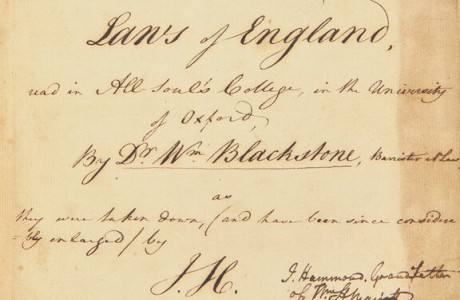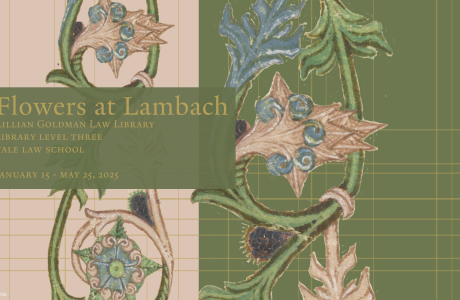Life and Law in Early Modern England - Sir Edward Coke
Sir Edward Coke, 1552-1634. Les reports de Edvvard Coke l’attorney generall le Roigne (London, 1601?). Rare Book Collection, Lillian Goldman Law Library; acquired with the John A. Hoober Fund.

Sir Edward Coke, 1552-1634. [Coke on Littleton] The first part of the Institutes of the lawes of England (London, 1633). Rare Book Collection, Lillian Goldman Law Library; acquired with the Ford Motor Company Fund.

Edward Coke was called to the bar in 1578 and quickly gained renown for his trial skills. He successfully argued Shelley’s Case (1581), which established an important rule regarding remainders in the transfer of real property by deed, and which bedevils beginning law students to this day. As Attorney General, Coke was responsible for the prosecutions of the Earl of Essex, following his unsuccessful coup d’etat, and Sir Walter Raleigh for treason. James I appointed Coke to be Chief Justice of the Court of Common Pleas and later Lord Chief Justice of King’s Bench. In that position he frequently clashed with the King and Lord Chancellor Francis Bacon over the extent of the King’s prerogative and the power of the Chancery Court, asserting the right of judicial review. After being driven from the bench, he sat for multiple parliaments, playing an important role in drafting the 1628 Petition of Right, which asserted the independence of parliament in the face of the absolutism of Charles I.
In addition to his work as a lawyer and judge, Coke’s legacy was established with the publication of his eleven volumes of law reports, which helped compile essential common law precedents. In 1628, Coke published his most important work, his Commentary upon Littleton. Coke’s annotations of Littleton’s Tenures, a fifteenth-century treatise on property, quickly became an authoritative text for common lawyers in England and later the United States.
One of the early annotators of the Coke on Littleton displayed here was Samuel Butler (1613-1680), author of Hudibras, an enormously popular and influential satire about the Puritans.
– Justin Zaremby
“Life and Law in Early Modern England,” an exhibition marking the Centenary of the Elizabethan Club, is curated by Justin Zaremby with Mike Widener, and is on display February-May 2011 in the Rare Book Exhibition Gallery, Level L2, Lillian Goldman Law Library Yale Law School.


